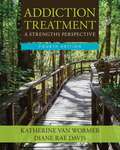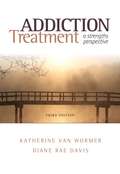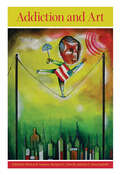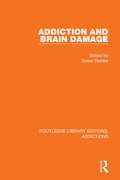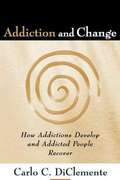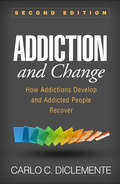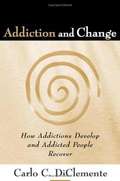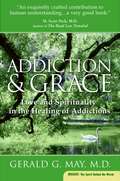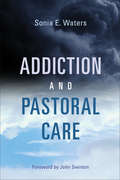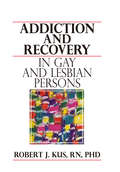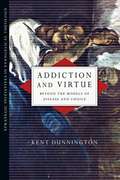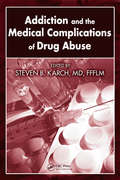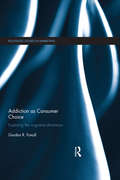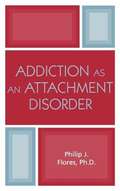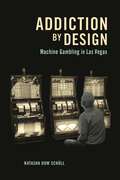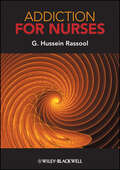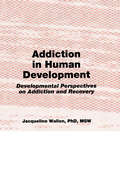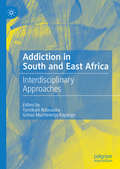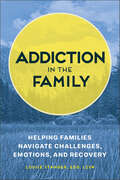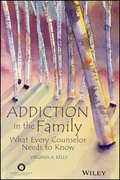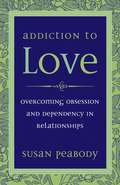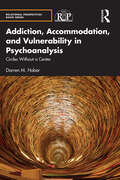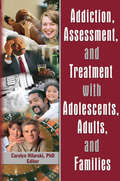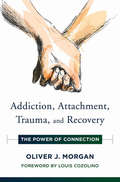- Table View
- List View
Addiction Treatment: A Strengths Perspective (Fourth Edition)
by Diane Rae Davis Katherine Van WormerADDICTION TREATMENT covers the biological, psychological, and social aspects of alcoholism, eating disorders, compulsive gambling, and other addictions. The authors bridge the gap between the popular twelve-step and harm-reduction approaches, thus illuminating how you, as a future practitioner, can guide your clients down a trusted path that is tailored towards the client's particular needs. Through a number of first-person narratives about the experience of addiction, you will discover a realism and depth not commonly found in textbooks. Interesting and relevant topics -- such as the case against so-called underage drinking laws and an inside story of working in a casino -- draw you into the material and illustrate the importance of reducing harm within the biopsychological framework that ties the text together.
Addiction Treatment: A Strengths Perspective (Third Edition)
by Diane Rae Davis Katherine Van WormerThis book covers the biological, psychological, and social aspects of alcoholism, eating disorders, compulsive gambling, and other addictions.
Addiction and Art
by Patricia B. Santora Margaret L. Dowell Jack E. HenningfieldHighly Commended in Psychiatry, 2011 BMA Medical Book Awards. British Medical AssociationAddiction to alcohol, tobacco, and other drugs is one of the major public health issues of our time. It accounts for one of every five deaths in the United States and costs approximately one-half trillion dollars per year in health care expenditures and lost productivity. Its human costs are untold and perhaps uncountable. Addiction and Art puts a human face on addiction through the creative work of individuals who have been touched by it.The art included here presents unique stories about addiction. Many pieces are stark representations of life on the edge. Others are disturbing contemplations of life, meaning, and death. Some even reflect the allure of addiction and a fondness for substance abuse. A panel of addiction scientists, artists, and professionals from the art world selected the 61 pieces included here from more than 1,000 submissions. Accompanied by a written statement from the artist, each creation is emblematic of the destructive power of addiction and the regenerative power of recovery. Stunning and occasionally unsettling, this unique portfolio reveals addiction art as a powerful complement to addiction science.
Addiction and Brain Damage (Routledge Library Editions: Addictions #3)
by Derek RichterOriginally published in 1980, recent research had produced new insights into how, at the biochemical level, alcohol and other drugs of abuse can impair metabolic and neuropsychiatric functions. Epidemiological studies were also demonstrating that even moderate drinking or drug abuse can produce significant brain damage. This book draws together the latest biochemical, physiological and clinical research on these topics at the time. The initial chapters discuss how alcohol can interfere with various functions: the adaptability of metabolic processes as governed by the ability of the liver to synthesise new enzymes, cell membrane transport, nervous transmission and the transport of nutrients into the brain. It is suggested that opiates, and possibly alcohol, may affect the endorphin system by blocking the uptake of specific amino acids. The second half of the book reports clinical investigations using biochemical studies, psychological tests, EEG investigations and Computerised Axial Tomography (CAT) scanning. It gives the first report of a long-term study by Lishman and co-workers using an improved tomography technique to assess brain damage in alcoholics. These studies give convincing evidence that heavy drinking, even at socially-acceptable levels, can cause serious brain damage in vulnerable people.
Addiction and Change
by Carlo DiclementeThe stages-of-change model has become widely known as a framework for conceptualizing recovery. Less well known are the processes that drive movement through the stages or how the stages apply to becoming addicted. From Carlo C. DiClemente, codeveloper of the transtheoretical model, this book offers a panoramic view of the entire continuum of addictive behavior change. The author illuminates the common path that individuals travel as they establish and reinforce new patterns of behavior, whether they are developing an addiction or struggling to free themselves from one, and regardless of the specific addictive behavior. The book addresses crucial questions of why, when, and how to intervene to bolster recovery in those already addicted and reach out effectively to people at risk.
Addiction and Change, Second Edition: How Addictions Develop and Addicted People Recover
by Carlo C. DiClementeNot everyone who experiments with substance use or risky behavior becomes addicted, and many who are addicted have been able to recover. This authoritative book, now revised and updated, has given tens of thousands of professionals and students a state-of-the-art framework for understanding the journey both into and out of addiction. From Carlo C. DiClemente, codeveloper of the transtheoretical model (TTM), the book identifies the stages and processes involved in initiating, modifying, maintaining, or stopping any pattern of behavior. Grounded in extensive research, and illustrated with vivid case examples, the book shows how using the TTM can help overcome obstacles to change and make treatment and prevention more effective. New to This Edition *Incorporates 15 years of research advances, contemporary prevention and treatment approaches, and the ongoing development of the TTM. *Chapter on current developments in intervention research. *Expanded discussions of neuroscience; self-regulation; behavioral economics; self-help, mutual help, and spirituality; motivational issues; "process addictions" (gambling and sex addiction); and more. *Deeper coverage of risk and protective factors across adolescent and young adult development.
Addiction and Change: How Addictions Develop and Addicted People Recover
by Carlo C. DiclementeDiClemente (psychology, University of Maryland) views addiction as a process of intentional behavior change, and defines the four steps in his transtheoretical model: contemplation, preparation, action, and maintenance. He then proposes that the same process marks the path to addiction as it does for recovery, and suggest ways to tailor interventions to persons at different points in the change process. Annotation (c)2003 Book News, Inc., Portland, OR (booknews.com)
Addiction and Grace: Love and Spirituality in the Healing of Addictions (Leader's Guide Ser.)
by Gerald G. MayAddiction and Grace offers an inspiring and hope-filled vision for those who desire to explore the mystery of who and what they really are.<P><P> May examines the "processes of attachment" that lead to addiction and describes the relationship between addiction and spiritual awareness. He also details the various addictions from which we can suffer, not only to substances like alcohol and drugs, but to work, sex, performance, responsibility, and intimacy. Drawing on his experience as a psychiatrist working with the chemically dependent, May emphasizes that addiction represents an attempt to assert complete control over our lives. Addiction and Grace is a compassionate and wise treatment of a topic of major concern in these most addictive of times, one that can provide a critical yet hopeful guide to a place of freedom based on contemplative spirituality.
Addiction and Pastoral Care
by John Swinton Sonia E. WatersA timely resource treating addiction holistically as both a spiritual and a pathological conditionSubstance addictions present a unique set of challenges for pastoral care. In this book Sonia Waters weaves together personal stories, research, and theological reflection to offer helpful tools for ministers, counselors, chaplains, and anyone else called to care pastorally for those struggling with addiction.Waters uses the story of the Gerasene demoniac in Mark’s Gospel to reframe addiction as a “soul-sickness” that arises from a legion of individual and social vulnerabilities. She includes pastoral reflections on oppression, the War on Drugs, trauma, guilt, discipleship, and identity. The final chapters focus on practical-care skills that address the challenges of recovery, especially ambivalence and resistance to change.
Addiction and Pastoral Care
by Sonia E. WatersA timely resource treating addiction holistically as both a spiritual and a pathological conditionSubstance addictions present a unique set of challenges for pastoral care. In this book Sonia Waters weaves together personal stories, research, and theological reflection to offer helpful tools for ministers, counselors, chaplains, and anyone else called to care pastorally for those struggling with addiction.Waters uses the story of the Gerasene demoniac in Mark&’s Gospel to reframe addiction as a &“soul-sickness&” that arises from a legion of individual and social vulnerabilities. She includes pastoral reflections on oppression, the War on Drugs, trauma, guilt, discipleship, and identity. The final chapters focus on practical-care skills that address the challenges of recovery, especially ambivalence and resistance to change.
Addiction and Recovery in Gay and Lesbian Persons
by Robert J KusThis book provides chemical dependency clinicians a sampling of the work being done in the fields of gay and lesbian chemical dependency to enable clinicians to provide better care for their gay and lesbian clients.After an overview of 7 research studies which examine the incidence of alcoholism and/or chemical dependency in gay and lesbian persons, the contributing authors explore the special concerns of recovering gay and lesbian addicts.Chapters focus not only on issues in the fields of gay and lesbian chemical dependency but how clinicians can use this knowledge to better care for their gay and lesbian clients. Readers will find new information on: working with HIV positive persons homophobia as a critical root in chemically dependent gays and lesbians positive changes for dysfunctional relationships common with gays and lesbians spirituality in gay and lesbian communities the special needs of the rural gay/lesbian client gay men&’s groups in AA a retrospective of NALGAP resources and referrals for chemically dependent gay and lesbian personsAddiction and Recovery in Gay and Lesbian Persons assists social workers and other helping professionals working with chemically dependent clients learn more about how to adequately treat them. Gay and lesbian persons recovering from a chemical addiction will also find this book enlightening.
Addiction and Virtue: Beyond the Models of Disease and Choice
by Kent J. DunningtonWhat is addiction? Neither of the current dominant models (disease or choice) adequately accounts for the experience of those who are addicted or of those who are seeking to help them.
Addiction and the Medical Complications of Drug Abuse
by Steven B. KarchExtracted from the Drug Abuse Handbook, 2nd edition, to give you just the information you need at an affordable price.Addiction and the Medical Complications of Drug Abuse explores the physiological and psychological phenomenon of addiction including the nature of dependence, the dependence potential of drugs, and the i
Addiction as Consumer Choice: Exploring the Cognitive Dimension (Routledge Studies in Marketing)
by Gordon FoxallA striking characteristic of addictive behavior is the pursuit of immediate reward at the risk of longer-term detrimental outcomes. It is typically accompanied by the expression of a strong desire to cease from or at least control consumption that has such consequences, followed by lapse, further resolution, relapse, and so on. Understood in this way, addiction includes substance abuse as well as behavioral compulsions like excessive gambling or even uncontrollable shopping. Behavioral economics and neurophysiology provide well-worn paths to understanding this behavior and this book regards them as central components of this quest. However, the specific question it seeks to answer is, What part does cognition – the desires we pursue and the beliefs we have about how to accomplish them – play in explaining addictive behavior? The answer is sought in a methodology that indicates why and where cognitive explanation is necessary, the form it should take, and the outcomes of employing it to understand addiction. It applies the Behavioral Perspective Model (BPM) of consumer choice, a tried and tested theory of more routine consumption, ranging from everyday product and brand choice, through credit purchasing and environmental despoliation, to the more extreme aspects of consumption represented by compulsion and addiction. The book will advance debate among behavioral scientists, cognitive psychologists, and other professionals about the nature of economic and social behavior.
Addiction as an Attachment Disorder
by Philip J. FloresFrom the Foreword: "Addiction is a disorder in self-regulation. Individuals who become dependent on addictive substances cannot regulate their emotions, self-care, self-esteem, and relationships. In this monumental and illuminating text Philip Flores covers all the reasons why this is so. But it is the domain of interpersonal relations that he makes clear why individuals susceptible to substance use disorders (SUDs) are especially vulnerable. His emphasis on addiction as an attachment disorder is principally important because he provides extensive scholarly and clinical insights as to why certain vulnerable individuals so desperately need to substitute chemical solutions and connections for human ones. The strength of Flores's paradigm of addiction as an attachment disorder is that it is a theory that effectively and wisely guides treatment, but at the same time, when properly implemented or practiced, the treatment resonates with and further enhances the theory. Flores's work here is an extraordinary one because, in parsimonious and clear language, he makes a major contribution to the literature and practice of effective psychotherapy in general and effective psychotherapy for the addictions in particular. He fills in all the gaps between theory and practice covering wide and ranging issues of what practice and empirical findings have to teach about the critical ingredients of AA, group therapy, and individual psychotherapy. This is a job well done because it helps students and experienced clinicians alike to always be mindful of how they bring their humanity to the distress and suffering of others. His theory of addiction as an attachment disorder makes it particularly clear how especially important this is for those suffering with addictive disorders. " —Edward J. Khantzian, M.D., clinical professor of psychiatry, Harvard Medical School
Addiction by Design: Machine Gambling in Las Vegas
by Natasha Dow SchüllAn anthropologist looks at the new "crack cocaine" of high-tech gamblingRecent decades have seen a dramatic shift away from social forms of gambling played around roulette wheels and card tables to solitary gambling at electronic terminals. Slot machines, revamped by ever more compelling digital and video technology, have unseated traditional casino games as the gambling industry's revenue mainstay. Addiction by Design takes readers into the intriguing world of machine gambling, an increasingly popular and absorbing form of play that blurs the line between human and machine, compulsion and control, risk and reward.Drawing on fifteen years of field research in Las Vegas, anthropologist Natasha Dow Schüll shows how the mechanical rhythm of electronic gambling pulls players into a trancelike state they call the "machine zone," in which daily worries, social demands, and even bodily awareness fade away. Once in the zone, gambling addicts play not to win but simply to keep playing, for as long as possible—even at the cost of physical and economic exhaustion. In continuous machine play, gamblers seek to lose themselves while the gambling industry seeks profit. Schüll describes the strategic calculations behind game algorithms and machine ergonomics, casino architecture and "ambience management," player tracking and cash access systems—all designed to meet the market's desire for maximum "time on device." Her account moves from casino floors into gamblers' everyday lives, from gambling industry conventions and Gamblers Anonymous meetings to regulatory debates over whether addiction to gambling machines stems from the consumer, the product, or the interplay between the two.Addiction by Design is a compelling inquiry into the intensifying traffic between people and machines of chance, offering clues to some of the broader anxieties and predicaments of contemporary life. At stake in Schüll's account of the intensifying traffic between people and machines of chance is a blurring of the line between design and experience, profit and loss, control and compulsion.
Addiction for Nurses
by G. Hussein RassoolNurses are acknowledged as key agents in addressing alcohol and drug misuse at individual, family, and community levels. Addiction nursing is central to the assessment, management, and care of people with problematic use of psychoactive substances (both legal and illegal). Work takes place in a wide range of settings, from traditional hospital clinics and wards to community locations such as police custody suites and needle exchange facilities. Addiction for Nurses is a comprehensive textbook for students, explaining the role of the nurse at each stage of intervention. Early chapters approach the subject from sociological, historical, and cultural perspectives, covering significant topics such as the nature of addiction, its social context, and addiction theory. The book then presents vital information about each of the main areas of addiction (nicotine, alcohol, opiates, cannabis, psychostimulants, and hallucinogens) with clinical and practical guidance on recognition, assessment, and treatment intervention strategies. Further chapters consider dealing with emergencies, blood-borne viruses, harm reduction, and work with specific client groups (for instance, black and ethnic minority communities, or those with special needs). This book is an essential resource for all those who come into contact with alcohol and drug misusers and for specialist addiction nurses preparing for practice in this complex and rewarding field.
Addiction in Human Development: Developmental Perspectives on Addiction and Recovery
by Bruce Carruth Jacqueline WallenFind fresh perspectives on the treatment of addictions and effective methods for helping recovering alcohol and drug abusers in this valuable book!Addiction in Human Development provides practical strategies based on theories of human development for working with clients recovering from alcoholism and drug addiction. An understanding of these theories will help therapists and addictions counselors recognize stages of recovery and better select appropriate interventions for every phase of treatment of addicted clients.Addiction in Human Development shows how a developmental perspective is particularly appropriate to the treatment of alcohol and substance abusers and the patterns involved in their addiction. Disruptions in clients’childhood or adolescent development, stemming from their own or a parent’s drug abuse, can influence their present recovery process. This informative book also describes the developmental course of addiction and provides tools designed to interrupt addictive patterns. In addition, stages in the developmental process of recovery are identified to help therapists select appropriate interventions.Some of the topics related to human development and addiction covered in this insightful volume include developmental deficits and developmental arrest in recovering clients, delayed reactions to sexual abuse and other childhood trauma, stages in recovery from alcoholism or drug addiction, developmental issues in the professional’s own life, and multi-problem families with a multigenerational history of substance abuse. Applying these developmental strategies to work with addicted individuals will significantly improve communication and rapport between helping professionals and recovering addicts and lead to more success in alcohol and drug addiction therapy.
Addiction in South and East Africa: Interdisciplinary Approaches
by Grivas Muchineripi Kayange Yamikani NdasaukaThis book explores both the existence and prevalence of addiction in South and East Africa, departing from traditional assumptions about addiction in the region. The authors employ an interdisciplinary approach to understand the actual prevalence of addiction and the forms it takes in South and East Africa. The book also addresses the perceptions and conceptualisation of addiction in the region, in addition to discussing specific issues related to drug and alcohol abuse and addiction, social media addiction, and sex addiction.
Addiction in the Family: Helping Families Navigate the Challenges, Emotions, and Recovery
by Louise StangerA practical and supportive guide for families struggling with addictionGet compassionate guidance that shows you how to navigate the unique challenges faced when a family member is suffering from a substance use disorder (SUD). Addiction in the Family helps you better understand what your loved one is going through while also offering realistic advice for approaching their addiction and how it affects your entire family.Drawing on Dr. Louise Stanger's years of experience as an SUD and family trauma clinician, Addiction in the Family allows you to take things at your own pace and concentrate on the areas where you need the most help. Whether it's finding ways to help your loved one, concentrating on your own self-care, or starting the healing and recovery journey, you'll find practical and thoughtful guidance.Addiction in the Family is:Family-focused—Get advice that addresses the dynamics and challenges of dealing with a partner, child, or other family member who is suffering from SUD.Practical and hopeful—Learn how to set boundaries, deal with strong emotions, and find addiction treatment options, as well as the best ways to communicate with a loved one compassionately and honestly.Filled with real-life examples—Realize that you aren't alone thanks to composite anecdotes—drawn from Dr. Louise's practice—that help you contextualize your experiences.Addiction in the Family will help you discover a measured and considerate way to approach a family member suffering from SUD.
Addiction in the Family: What Every Counselor Needs to Know
by Virginia A. KellyThis book identifies and addresses potential clinical issues for clients who have family members struggling with addiction, and offers concrete strategies for treatment. Viewing addiction as a family disease, Dr. Kelly explores the complex challenges faced by family members, examines the ways in which substance use disorders affect family dynamics, and discusses behaviors that help sustain recovery and create and maintain healthy relationships. A brief history of substance abuse is provided, as are the primary models of addiction and family theory. Chapters on codependency and the emotional, relational, and behavioral consequences of living with a family member with a substance use disorder follow. The universality of substance abuse is then examined along with specific ethnic and cultural differences. Family support group treatment options complete the text. Case conceptualization exercises that contain reflections, implications for the counselor, and discussion questions for application of the material are interspersed throughout the book to link theory to practice. *Requests for digital versions from the ACA can be found on wiley.com. *To request print copies, please visit the ACA website here. *Reproduction requests for material from books published by ACA should be directed to permissions@counseling.org.
Addiction to Love: Overcoming Obsession and Dependency in Relationships
by Susan PeabodyLove addiction manifests in many forms, from Fatal Attraction-type obsessive lust to less extreme but nonetheless psychologically and emotionally harmful forms. The most common of these is staying in a bad relationship because of a fear of being alone-the "I hate you but don'¬?t leave me" relationship. In ADDICTION TO LOVE, recovering love addict Susan Peabody explains the variety of ways this disorder plays out, from the obsessively doting love addict to the addict who can'¬?t disentangle from an unfulfilling, dead-end relationship. Peabody provides an in-depth and easy-to-follow recovery program for those suffering from this unhealthy and often dangerous addiction and explains how to create a loving, safe, and fulfilling relationship.A seminal work on unhealthy and obsessive behaviors in love, and how to change behavior to have a positive relationship. This third edition includes a new introduction and revisions to the text throughout.Some symptoms of love addiction include love at first sight, excessive fantasizing, abnormal jealousy, nagging, and accepting dishonesty.Even relationships with parents, children, siblings, or friends may be addictive-dependency is not always related to romantic love.Previous editions have sold more than 40,000 copies."Love addiction is a three-headed serpent that Susan Peabody adeptly slays. This is the quintessential book for any love addict or counselor needing to fully understand this highly prevalent and complex disorder. Susan detects and dissects aspects of this condition not comprehended in other books of its kind. Recovery is possible. This book makes it possible to take the succinct steps necessary toward a loving and reciprocal long-term intimate relationship."-Sudi Scull, M.F.T., C.N., psychotherapist and nutritionistFrom the Trade Paperback edition.
Addiction, Accommodation, and Vulnerability in Psychoanalysis: Circles without a Center (Relational Perspectives Book Series)
by Darren HaberThis book explores the compulsions and trauma that underlie addiction, using an intersubjective approach in seeking to understand the inspirations and challenges arising from the psychoanalytic treatment of addiction, compulsivity, and related dissociative conditions. Drawing on insights from his own analytic practice and personal experience, in addition to the work of Stolorow, Brandchaft and Winnicott, among others, Haber considers the complex ways in which addiction becomes woven into a person’s life, and analyses how it interacts with other problems such as depression and anxiety, self-fragmentation, and ambivalence about treatment. Haber creatively integrates the work of Camus, Kafka, and Beckett to further contemplate the dilemmas that can arise during the clinical process and, in identifying his own and his patients’ vulnerabilities and contradictions, provides an honest, humorous and sometimes painful account of what happens in the consulting room. With its use of rich clinical material and an accessible and vivid writing style, this book will appeal to all psychoanalysts and psychotherapists working with patients affected by addiction, as well as other professionals seeking new insights into effective strategies for treating this most challenging malady.
Addiction, Assessment, and Treatment with Adolescents, Adults, and Families
by M. Carolyn HilarskiTime-effective intervention and prevention tools for dealing with addictionAddiction, Assessment, and Treatment with Adolescents, Adults, and Families examines addiction concerns ranging from prevention to relapse, offering effective intervention techniques and assessment tools to ensure delivery of the best possible service to clients who represent a variety of populations and mental health issues. Leading addiction researchers address new developments in theory, methodology, treatment, and assessment on counselor beliefs, contingency management, group treatment, rapid assessment instruments, behavioral couples therapy (BCT), family-based intervention, motivational interviewing, and 12-step programs and faith-based recovery. This essential professional and academic resource presents case studies, reviews, research findings, and empirical papers that offer unique perspectives on a variety of topics, including evidenced-based practice, theory of reasoned action, harm reduction, juvenile justice, and treatment outcomes.Addiction, Assessment, and Treatment with Adolescents, Adults, and Families presents sophisticated, cutting-edge theory and practice concepts that provide professionals, practitioners, and educators with a more varied focus than most current available books on addiction. Counselors working in mental health settings and EAP programs, psychiatric nurses working in hospitals and outpatient settings, social workers, and students pursuing degrees in social work, nursing, psychology, and criminal justice will benefit from the book&’s wide range of appropriate addiction, treatment, and prevention methodologies.Topics addressed in Addiction, Assessment, and Treatment with Adolescents, Adults, and Families include: understanding the gap between research and practice in substance abuse counseling prevalence and patterns of illicit drug use among juvenile offenders the relationship between the reported substance abuse of African-American and Hispanic youth and their perceived attachments with their primary caregivers using a harm reduction approach to the evaluation of treatment outcomes using a nonconfrontational approach to substance abuse counseling when addressing client denial why contingency management interventions are underutilized, especially in community settings how to determine if and when Motivational Interviewing (MI) and Adapted Motivational Interviewing (AMI) are effective how to use nonabstinence-based prevention services in working with adolescents how to use and score the K6 scale to screen serious mental illnesses how to use Receiver Operating Characteristics analysis to evaluate rapid assessment instrumentsAddiction, Assessment, and Treatment with Adolescents, Adults, and Families is a vital professional resource and an invaluable aid to adults, adolescents, and families of anyone suffering with some level of addiction.
Addiction, Attachment, Trauma and Recovery: The Power Of Connection (Norton Series on Interpersonal Neurobiology #0)
by Oliver J. MorganA new model of addiction that incorporates neurobiology, social relationships, and ecological systems. Understanding addiction is no longer just about understanding neurons or genes, broken brain functioning, learning, or faulty choices. Oliver J. Morgan provides a fresh take on addiction and recovery by presenting a more inclusive framework than traditional understanding. Cutting- edge work in attachment, interpersonal neurobiology, and trauma is integrated with ecological- systems thinking to provide a consilient and comprehensive picture of addiction. Humans are born into connection and require nourishing relationships for healthy living. Adversities, however, bring fragmentation and create the conditions for ill health. They create vulnerabilities. In order to cope, individuals can turn to alternatives, “substitute relationships” that ease the pain of disconnection. These can become addictions. Addiction, Attachment, Trauma, and Recovery presents a model, a method, and a mandate. This new focus calls for change in the established ways we think and behave about addiction and recovery. It reorients understanding and clinical practice for mental health and addiction counselors, psychologists, and social workers, as well as for addicts and those who love them.
